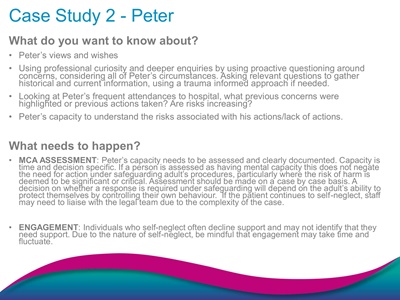
Case Study 2 - Peter
What do you want to know about?
• Peter's views and wishes
• Using professional curiosity and deeper enquiries by using proactive questioning around
concerns, considering all of Peter's circumstances. Asking relevant questions to gather
historical and current information, using a trauma informed approach if needed.
• Looking at Peter's frequent attendances to hospital, what previous concerns were
highlighted or previous actions taken? Are risks increasing?
• Peter's capacity to understand the risks associated with his actions/lack of actions.
What needs to happen?
• MCA ASSESSMENT: Peter's capacity needs to be assessed and clearly documented. Capacity is
time and decision specific. If a person is assessed as having mental capacity this does not negate
the need for action under safeguarding adult's procedures, particularly where the risk of harm is
deemed to be significant or critical. Assessment should be made on a case by case basis. A
decision on whether a response is required under safeguarding will depend on the adult's ability to
protect themselves by controlling their own behaviour. If the patient continues to self-neglect, staff
may need to liaise with the legal team due to the complexity of the case.
• ENGAGEMENT: Individuals who self-neglect often decline support and may not identify that they
need support. Due to the nature of self-neglect, be mindful that engagement may take time and
fluctuate.